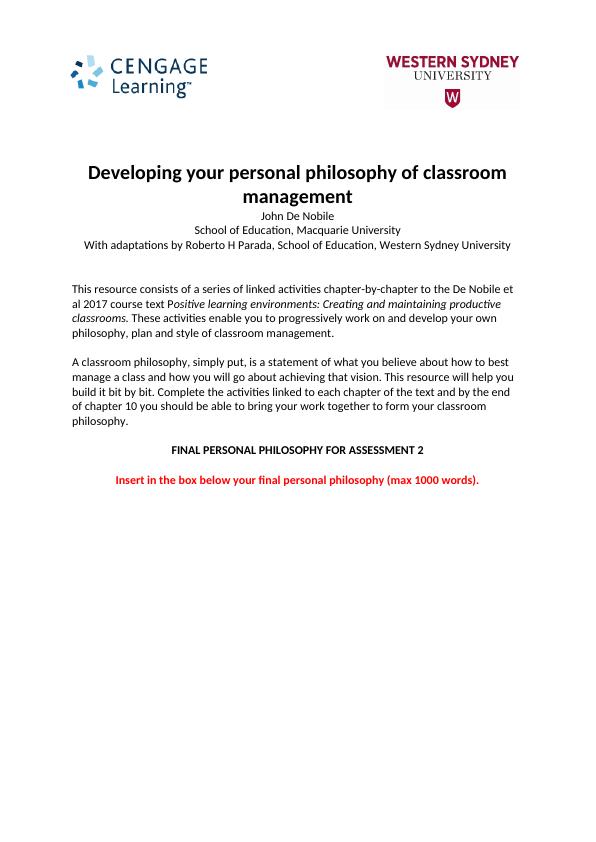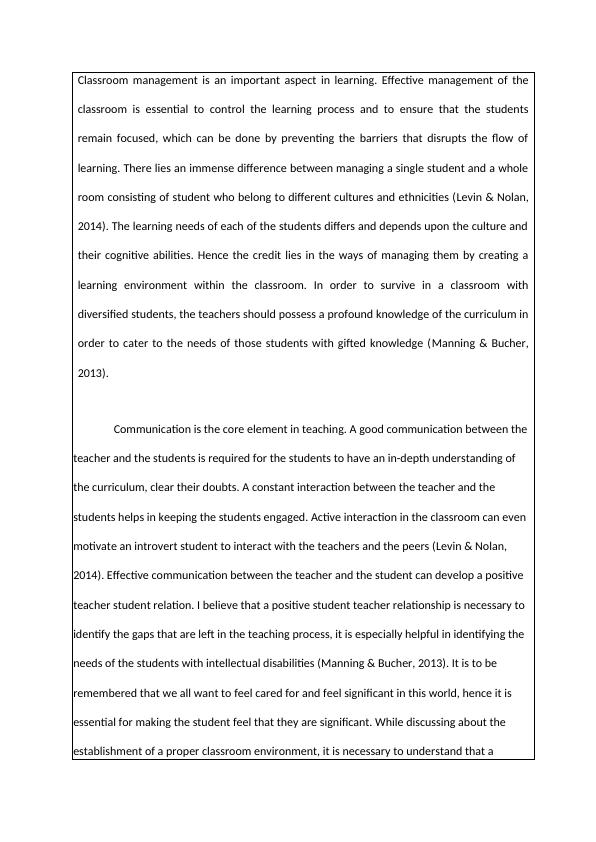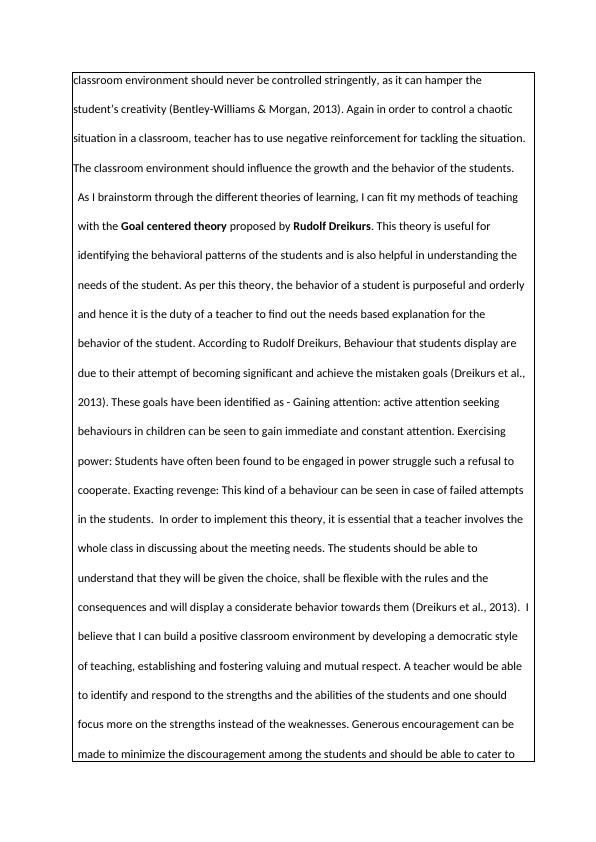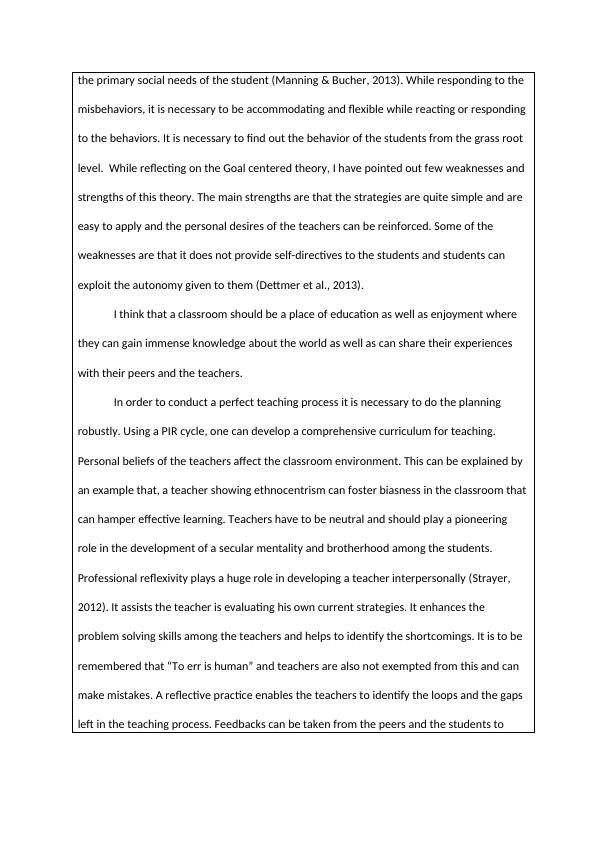Developing Your Personal Philosophy of Classroom Management
16 Pages4211 Words423 Views
Added on 2023-06-11
About This Document
This resource from Desklib helps you develop your own philosophy, plan, and style of classroom management. It covers topics such as effective communication, building positive relationships, and using different theories of behavior and classroom management. By the end of the course, you will have a better understanding of how to create a positive learning environment for your students.
Developing Your Personal Philosophy of Classroom Management
Added on 2023-06-11
ShareRelated Documents
Developing your personal philosophy of classroom
management
John De Nobile
School of Education, Macquarie University
With adaptations by Roberto H Parada, School of Education, Western Sydney University
This resource consists of a series of linked activities chapter-by-chapter to the De Nobile et
al 2017 course text Positive learning environments: Creating and maintaining productive
classrooms. These activities enable you to progressively work on and develop your own
philosophy, plan and style of classroom management.
A classroom philosophy, simply put, is a statement of what you believe about how to best
manage a class and how you will go about achieving that vision. This resource will help you
build it bit by bit. Complete the activities linked to each chapter of the text and by the end
of chapter 10 you should be able to bring your work together to form your classroom
philosophy.
FINAL PERSONAL PHILOSOPHY FOR ASSESSMENT 2
Insert in the box below your final personal philosophy (max 1000 words).
management
John De Nobile
School of Education, Macquarie University
With adaptations by Roberto H Parada, School of Education, Western Sydney University
This resource consists of a series of linked activities chapter-by-chapter to the De Nobile et
al 2017 course text Positive learning environments: Creating and maintaining productive
classrooms. These activities enable you to progressively work on and develop your own
philosophy, plan and style of classroom management.
A classroom philosophy, simply put, is a statement of what you believe about how to best
manage a class and how you will go about achieving that vision. This resource will help you
build it bit by bit. Complete the activities linked to each chapter of the text and by the end
of chapter 10 you should be able to bring your work together to form your classroom
philosophy.
FINAL PERSONAL PHILOSOPHY FOR ASSESSMENT 2
Insert in the box below your final personal philosophy (max 1000 words).

Classroom management is an important aspect in learning. Effective management of the
classroom is essential to control the learning process and to ensure that the students
remain focused, which can be done by preventing the barriers that disrupts the flow of
learning. There lies an immense difference between managing a single student and a whole
room consisting of student who belong to different cultures and ethnicities (Levin & Nolan,
2014). The learning needs of each of the students differs and depends upon the culture and
their cognitive abilities. Hence the credit lies in the ways of managing them by creating a
learning environment within the classroom. In order to survive in a classroom with
diversified students, the teachers should possess a profound knowledge of the curriculum in
order to cater to the needs of those students with gifted knowledge (Manning & Bucher,
2013).
Communication is the core element in teaching. A good communication between the
teacher and the students is required for the students to have an in-depth understanding of
the curriculum, clear their doubts. A constant interaction between the teacher and the
students helps in keeping the students engaged. Active interaction in the classroom can even
motivate an introvert student to interact with the teachers and the peers (Levin & Nolan,
2014). Effective communication between the teacher and the student can develop a positive
teacher student relation. I believe that a positive student teacher relationship is necessary to
identify the gaps that are left in the teaching process, it is especially helpful in identifying the
needs of the students with intellectual disabilities (Manning & Bucher, 2013). It is to be
remembered that we all want to feel cared for and feel significant in this world, hence it is
essential for making the student feel that they are significant. While discussing about the
establishment of a proper classroom environment, it is necessary to understand that a
classroom is essential to control the learning process and to ensure that the students
remain focused, which can be done by preventing the barriers that disrupts the flow of
learning. There lies an immense difference between managing a single student and a whole
room consisting of student who belong to different cultures and ethnicities (Levin & Nolan,
2014). The learning needs of each of the students differs and depends upon the culture and
their cognitive abilities. Hence the credit lies in the ways of managing them by creating a
learning environment within the classroom. In order to survive in a classroom with
diversified students, the teachers should possess a profound knowledge of the curriculum in
order to cater to the needs of those students with gifted knowledge (Manning & Bucher,
2013).
Communication is the core element in teaching. A good communication between the
teacher and the students is required for the students to have an in-depth understanding of
the curriculum, clear their doubts. A constant interaction between the teacher and the
students helps in keeping the students engaged. Active interaction in the classroom can even
motivate an introvert student to interact with the teachers and the peers (Levin & Nolan,
2014). Effective communication between the teacher and the student can develop a positive
teacher student relation. I believe that a positive student teacher relationship is necessary to
identify the gaps that are left in the teaching process, it is especially helpful in identifying the
needs of the students with intellectual disabilities (Manning & Bucher, 2013). It is to be
remembered that we all want to feel cared for and feel significant in this world, hence it is
essential for making the student feel that they are significant. While discussing about the
establishment of a proper classroom environment, it is necessary to understand that a

classroom environment should never be controlled stringently, as it can hamper the
student’s creativity (Bentley-Williams & Morgan, 2013). Again in order to control a chaotic
situation in a classroom, teacher has to use negative reinforcement for tackling the situation.
The classroom environment should influence the growth and the behavior of the students.
As I brainstorm through the different theories of learning, I can fit my methods of teaching
with the Goal centered theory proposed by Rudolf Dreikurs. This theory is useful for
identifying the behavioral patterns of the students and is also helpful in understanding the
needs of the student. As per this theory, the behavior of a student is purposeful and orderly
and hence it is the duty of a teacher to find out the needs based explanation for the
behavior of the student. According to Rudolf Dreikurs, Behaviour that students display are
due to their attempt of becoming significant and achieve the mistaken goals (Dreikurs et al.,
2013). These goals have been identified as - Gaining attention: active attention seeking
behaviours in children can be seen to gain immediate and constant attention. Exercising
power: Students have often been found to be engaged in power struggle such a refusal to
cooperate. Exacting revenge: This kind of a behaviour can be seen in case of failed attempts
in the students. In order to implement this theory, it is essential that a teacher involves the
whole class in discussing about the meeting needs. The students should be able to
understand that they will be given the choice, shall be flexible with the rules and the
consequences and will display a considerate behavior towards them (Dreikurs et al., 2013). I
believe that I can build a positive classroom environment by developing a democratic style
of teaching, establishing and fostering valuing and mutual respect. A teacher would be able
to identify and respond to the strengths and the abilities of the students and one should
focus more on the strengths instead of the weaknesses. Generous encouragement can be
made to minimize the discouragement among the students and should be able to cater to
student’s creativity (Bentley-Williams & Morgan, 2013). Again in order to control a chaotic
situation in a classroom, teacher has to use negative reinforcement for tackling the situation.
The classroom environment should influence the growth and the behavior of the students.
As I brainstorm through the different theories of learning, I can fit my methods of teaching
with the Goal centered theory proposed by Rudolf Dreikurs. This theory is useful for
identifying the behavioral patterns of the students and is also helpful in understanding the
needs of the student. As per this theory, the behavior of a student is purposeful and orderly
and hence it is the duty of a teacher to find out the needs based explanation for the
behavior of the student. According to Rudolf Dreikurs, Behaviour that students display are
due to their attempt of becoming significant and achieve the mistaken goals (Dreikurs et al.,
2013). These goals have been identified as - Gaining attention: active attention seeking
behaviours in children can be seen to gain immediate and constant attention. Exercising
power: Students have often been found to be engaged in power struggle such a refusal to
cooperate. Exacting revenge: This kind of a behaviour can be seen in case of failed attempts
in the students. In order to implement this theory, it is essential that a teacher involves the
whole class in discussing about the meeting needs. The students should be able to
understand that they will be given the choice, shall be flexible with the rules and the
consequences and will display a considerate behavior towards them (Dreikurs et al., 2013). I
believe that I can build a positive classroom environment by developing a democratic style
of teaching, establishing and fostering valuing and mutual respect. A teacher would be able
to identify and respond to the strengths and the abilities of the students and one should
focus more on the strengths instead of the weaknesses. Generous encouragement can be
made to minimize the discouragement among the students and should be able to cater to

the primary social needs of the student (Manning & Bucher, 2013). While responding to the
misbehaviors, it is necessary to be accommodating and flexible while reacting or responding
to the behaviors. It is necessary to find out the behavior of the students from the grass root
level. While reflecting on the Goal centered theory, I have pointed out few weaknesses and
strengths of this theory. The main strengths are that the strategies are quite simple and are
easy to apply and the personal desires of the teachers can be reinforced. Some of the
weaknesses are that it does not provide self-directives to the students and students can
exploit the autonomy given to them (Dettmer et al., 2013).
I think that a classroom should be a place of education as well as enjoyment where
they can gain immense knowledge about the world as well as can share their experiences
with their peers and the teachers.
In order to conduct a perfect teaching process it is necessary to do the planning
robustly. Using a PIR cycle, one can develop a comprehensive curriculum for teaching.
Personal beliefs of the teachers affect the classroom environment. This can be explained by
an example that, a teacher showing ethnocentrism can foster biasness in the classroom that
can hamper effective learning. Teachers have to be neutral and should play a pioneering
role in the development of a secular mentality and brotherhood among the students.
Professional reflexivity plays a huge role in developing a teacher interpersonally (Strayer,
2012). It assists the teacher is evaluating his own current strategies. It enhances the
problem solving skills among the teachers and helps to identify the shortcomings. It is to be
remembered that “To err is human” and teachers are also not exempted from this and can
make mistakes. A reflective practice enables the teachers to identify the loops and the gaps
left in the teaching process. Feedbacks can be taken from the peers and the students to
misbehaviors, it is necessary to be accommodating and flexible while reacting or responding
to the behaviors. It is necessary to find out the behavior of the students from the grass root
level. While reflecting on the Goal centered theory, I have pointed out few weaknesses and
strengths of this theory. The main strengths are that the strategies are quite simple and are
easy to apply and the personal desires of the teachers can be reinforced. Some of the
weaknesses are that it does not provide self-directives to the students and students can
exploit the autonomy given to them (Dettmer et al., 2013).
I think that a classroom should be a place of education as well as enjoyment where
they can gain immense knowledge about the world as well as can share their experiences
with their peers and the teachers.
In order to conduct a perfect teaching process it is necessary to do the planning
robustly. Using a PIR cycle, one can develop a comprehensive curriculum for teaching.
Personal beliefs of the teachers affect the classroom environment. This can be explained by
an example that, a teacher showing ethnocentrism can foster biasness in the classroom that
can hamper effective learning. Teachers have to be neutral and should play a pioneering
role in the development of a secular mentality and brotherhood among the students.
Professional reflexivity plays a huge role in developing a teacher interpersonally (Strayer,
2012). It assists the teacher is evaluating his own current strategies. It enhances the
problem solving skills among the teachers and helps to identify the shortcomings. It is to be
remembered that “To err is human” and teachers are also not exempted from this and can
make mistakes. A reflective practice enables the teachers to identify the loops and the gaps
left in the teaching process. Feedbacks can be taken from the peers and the students to

End of preview
Want to access all the pages? Upload your documents or become a member.
Related Documents
Developing a Personal Philosophy of Classroom Managementlg...
|14
|4171
|462
Developing Your Personal Philosophy of Classroomlg...
|16
|2736
|387
Evaluation and Differentiation Plan of Teachinglg...
|18
|5547
|238
Improving Communication within Organizationlg...
|7
|1623
|178
Teaching Strategies for Reading Essaylg...
|9
|2429
|207
Reading and Writing Concept: I Do, We Do, You Dolg...
|4
|963
|331
